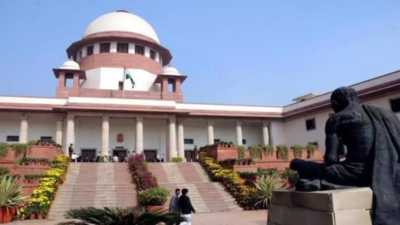
NEW DELHI: The
All India Muslim Personal Law Board
(AIMPLB) cited
Islamic law
(
Sharia
) to announce on Sunday that it will explore ways to get
Supreme Court
’s recent verdict allowing divorced Muslim women to claim maintenance beyond the 'iddat' period overturned.
AIMPLB, essentially a body of Sunni clerics, questioned the SC ruling and said it defied human reasoning.
“It does not augur well with human reasoning that men are held responsible for maintenance of their ex-wives even when the marriage is non-existent," said a board statement which invoked authority of the Prophet Muhammad and Allah to explain its stand.
The board decided to challenge Uniform Civil Code (UCC) law passed in Uttarakhand, while urging govt to sever strategic ties with Israel & pressure it to cease hostilities, & calling for "restoration" of the Places of Worship Act.
Describing Palestine crisis as a “humanitarian problem as Israel has illegally occupied and displaced citizens of Palestine”, it appealed to “Muslims of the world to exhibit genuine concern... which is not only a humanitarian cause but also basic requirement of the faithful”.
SC on July 10 affirmed that Section 125 of Code of Criminal Procedure applies to all married women, including Muslims, allowing them to claim maintenance from their husbands. The verdict from Justices B V Nagarathna and Augustine George Masih, which underscored the need for Indian men to recognise the contributions of homemakers and support them financially, has come in for praise.
The board in its statement said this judgment “will create further problems to these women who have successfully come out their painful relationship”. The board’s legal committee will explore ways to get the decision overturned
AIMPLB's stand on the decision is rooted in the belief that it contradicts Sharia, which mandates maintenance only during iddat period. After this period, a woman is free to remarry or live independently, with the ex-husband no longer responsible for her support.
On UCC, the board said its legal committee is preparing to challenge Uttarakhand's law, arguing that it undermines the country's diversity and constitutional principles, including religious freedom.
The statement also highlighted ongoing religious disputes, referencing the Worship Places Act of 1991, and called for the SC to apply this Act to recent disputes to prevent new conflicts. Additionally, it condemned the increase in mob lynching incidents, urging adherence to the rule of law.
We also published the following articles recently
Supreme Court: Muslim women entitled to maintenance under CrPC
Supreme Court landmark verdict ensures maintenance rights for all women, including divorced Muslim women. Learn how Section 125 of CrPC guarantees gender parity and equality under the law. Find out more about this significant ruling.












 English (US) ·
English (US) ·